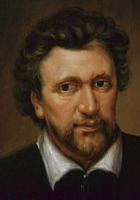On My First Son Poem by Ben Jonson
On My First Son
Farewell, thou child of my right hand, and joy;
My sin was too much hope of thee, lov'd boy.
Seven years thou'wert lent to me, and I thee pay,
Exacted by thy fate, on the just day.
O, could I lose all father now! For why
Will man lament the state he should envy?
To have so soon 'scap'd world's and flesh's rage,
And, if no other misery, yet age?
Rest in soft peace, and, ask'd, say here doth lie
Ben Jonson his best piece of poetry.
For whose sake, henceforth, all his vows be such,
As what he loves may never like too much.
What a wonderful poem. How it drains my heart to imagine this great man who lost one child after another. And the courage and sadness to say “his best of piece of poetry.”
Extremely poignant and sad. The words coming out of the heart of a mourning father. I quote: Rest in soft peace, and, ask'd, say here doth lie Ben Jonson his best piece of poetry.
A touching poem expressing a father`s love for his young son who died of the plague. The last line, in which the poet distinguishes between love and like, is especially poignant. Love, he says, is generous and selfless. It wants what is best for his son, which for a Christian is that he be reunited with his creator. Like, on the other hand, is human and selfish. It leaves the father wishing the boy were back in his arms, even though it means exposing him to the world`s and flesh`s rage.
On line 10 it should be.. 'Ben.Jonson' with the full stop this adds to the poem as; the unusual line split emphasises the word 'Ben' and this focuses the reader on his son. The odd punctuation after 'Ben' helps the line have two meanings; If we ignore the full stop we read: 'Here doth lye/Ben Jonson' (the child) If we obey the full stop, we read: 'Jonson (the poet) his best piece of poetry'. This is a deliberate confusion of the two names in the poem perhaps symbolises that he sees himself united as on with his son, emphasising the bond of love. He created his son as he created the poem so they are physically part of each other. The full stop, however, also helps to reflect the way death has separated father and son. I just that was an important part. Also the title should be 'On my first Sonne'.
His son died in 1603... This is a deeply religious poem and totally reflective of the time.
This poem has not been translated into any other language yet.
I would like to translate this poem
a good very touching poem about the sad loss of the poets only son in 1616 and the happieness he should feel for his son.